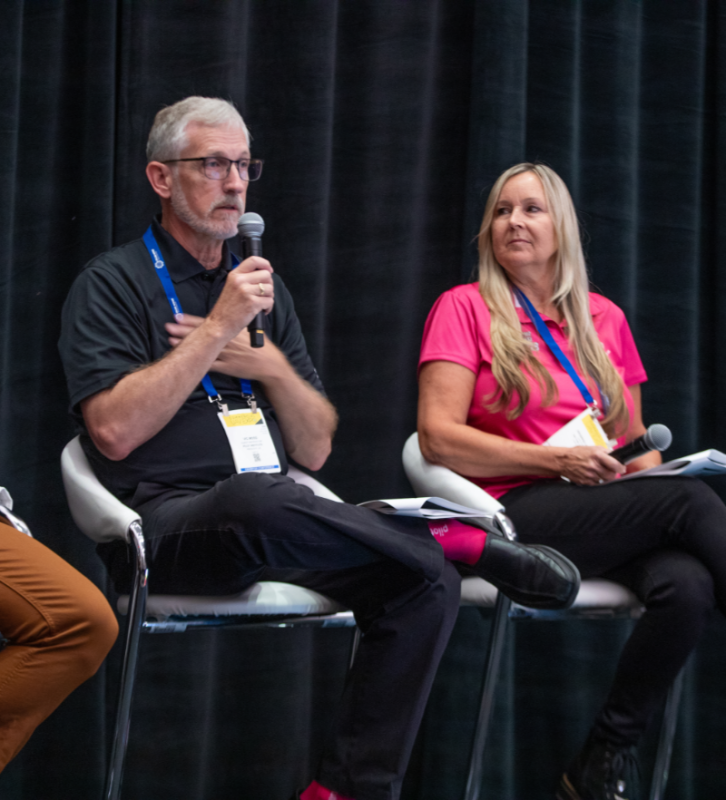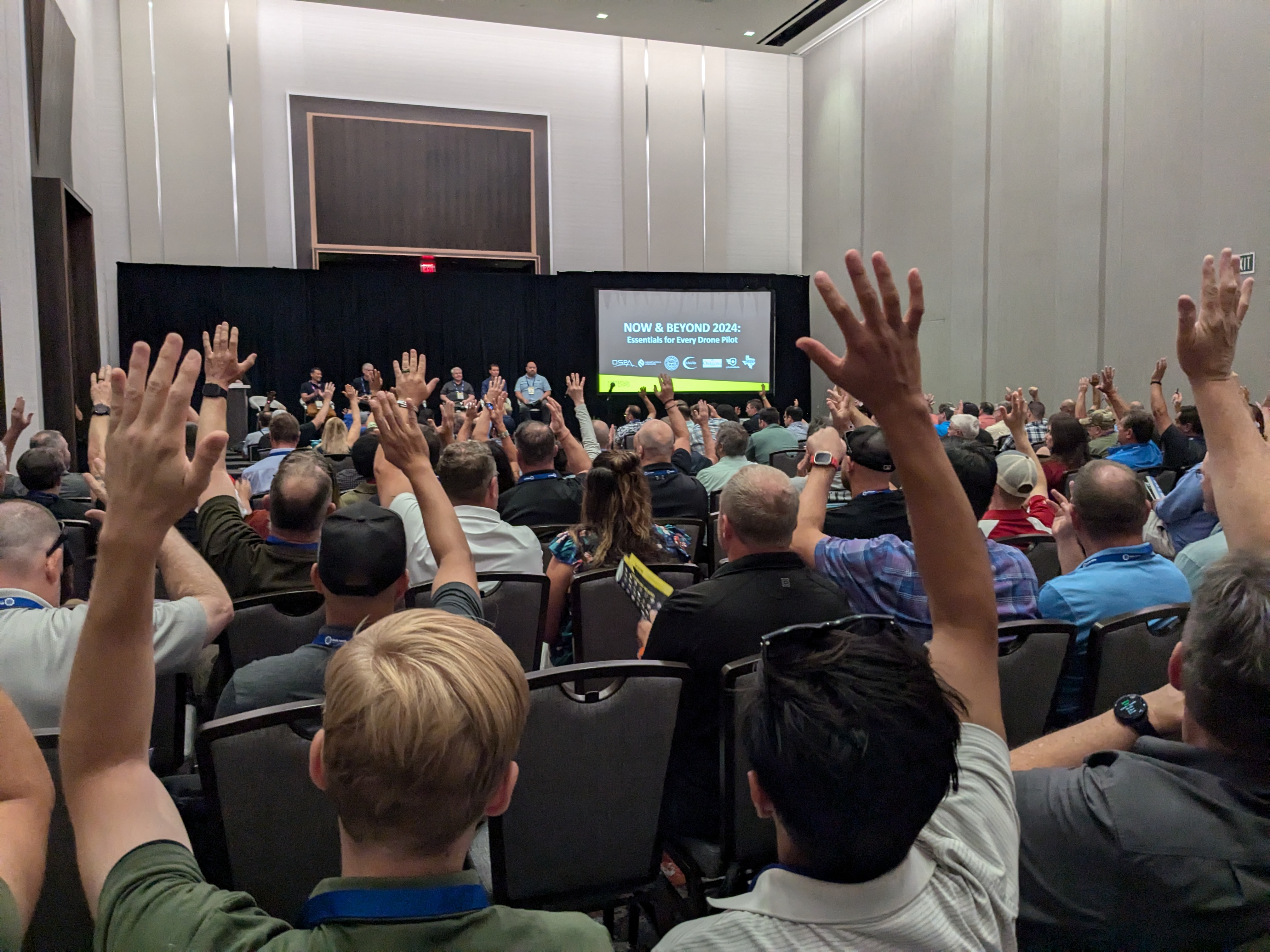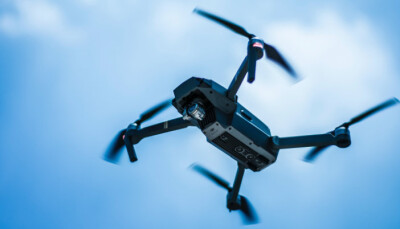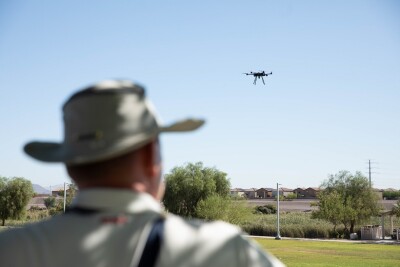Drone pilots are the backbone of the commercial UAV industry - you can find them tirelessly out in the field with a drone in the air, but also doing all of the preparation for successful flights, and spending hours in their offices working through deliverables for their clients and their use cases. New to Commercial UAV Expo this year is a Drone Pilot Hub, focused on providing content “from pilots - for pilots” and providing actionable advice and career development opportunities. Leading off the content was a panel featuring seasoned drone pilots, service providers, and even members of the FAA in an advice-packed session.
Amy Wiegand moderated a packed panel that included Desi Ekstein, Jared Janacek, Vic Moss, Greg Reverdiau, John Meehan and Kenji Sugahara. It was an invaluable opportunity to navigate the future of drone piloting, and was a standing-room-only session.
After a broad overview of some of the fastest-growing verticals for drone pilots (including construction, delivery, agriculture, energy and utilities, creative/media and more), the panelists covered a variety of topics - ranging from pilot training and safety to professionalism, and how to locate potential job opportunities and niches. Throughout the panel a few consistent themes emerged, offering valuable and consistent advice across the panel.
Safety from all sides

It is not a surprise that safety and safe operation would be topics stressed during this panel, but from the panel’s view, there are more than a few ways to define safety, and all need to be paid attention to. When looking for work with construction firms, for example, Moss and Ekstein urged people to get a better understanding of job site requirements for personal protective equipment or PPE before showing up to a location “in flip flops and shorts.” Personal safety is just as important as drone safety, and having a better understanding of OSHA or other requirements for safety can also enhance a drone pilot’s professionalism and hireability.
Panelists also stressed the need for people to comply with all the regulations, all the time, and to have checklists for safe operation. No one wants to see “yahoos” ruin opportunities for other drone pilots by thinking they can get away with cutting corners when it comes to compliance.
John Meehan of the FAA asked the audience at one point, “How many of you have a flight department?” to a scant raising of hands in the room. “Well, I’m here to tell you that in the eyes of the FAA - we look at you as if you are a flight department. You are aviators and flying aircraft operating in the National Airspace System.” Meehan added, “I hope with that realization that what you take away is a cultural mind shift.”
Paperwork and Insurance are boring, but must-haves
Though it isn’t a topic that many drone pilots think about top of mind when starting a drone services business, documentation and insurance can mean the difference between success and failure. While no one likes paperwork, and it can fall to the wayside, properly documenting your flights and deliverables are a good habit to get into - and can help drone pilots secure more work, look back on the work they’ve already done, and provide another level of professionalism. Keeping business documentation and having access your past data can actually help you grow your business.
To be properly insured can also help you to gain more work, because the client is taking on less risk. As Vic Moss put it, “You’re only as good as your last job.”
Understanding Beyond Piloting
One of the challenges discussed at many points in the panel was that drone piloting is about more than just the drone - anyone can become a pilot, but how many of those pilots can understand what their clients need, or know how to interpret the images and date they collect? How many can truly understand the principles of mapping and other specialized niches, and put that into practice? Those who can get a better understanding of what their clients are actually doing can have an advantage, and more work can come through this enhanced understanding. Panelists encouraged the audience to seek out additional education, whether that’s within the industries that they are working in by going to conferences or doing online courses, or just having more advanced discussions of what clients really need before starting a job.
Are there too many drone pilots?
Early in the panel, Vic Moss mentioned that some people who are interested in becoming drone pilots are being discouraged from the pursuit by saying that the market is “saturated.” Passionately disagreeing, Moss compared drone pilot services to other types of businesses, like restaurants and doctors offices. Yes, there are plenty of both in every town and city, but does that mean that you shouldn’t become one yourself? Just because there’s one type of restaurant doesn’t mean there can’t be another type - and there are plenty of opportunities out there for anyone looking.
The panel workshop touched on many additional themes throughout the packed session, and has set the stage for more pilot-to-pilot content on the Drone Pilot Hub during the rest of the Commercial UAV Expo, as well as primed many pilots for their successful careers ahead.
















Comments